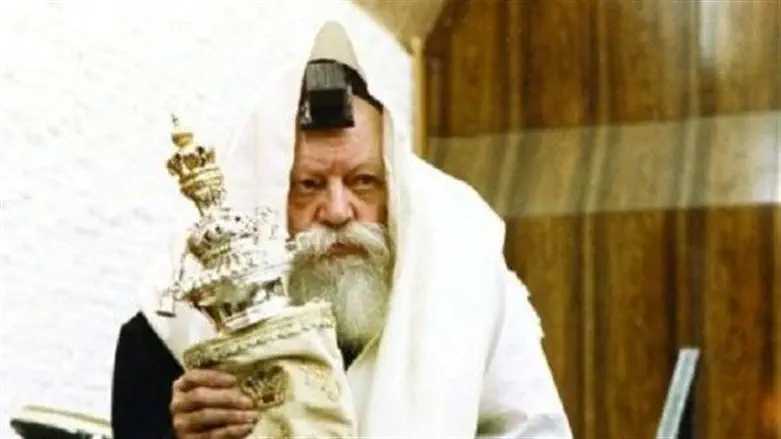
And the more he continues to set his mind on this yearning, the more will this yearning become correspondingly stronger, and will also extend to his mouth and to all his organs,
וְכָל מַה שֶּׁיַּתְמִיד לַחֲשׁוֹב בְּשִׂכְלוֹ כּוֹסֶף זֶה כָּכָה יִתְגַּבֵּר וְיִתְפַּשֵּׁט כּוֹסֶף זֶה גַּם בְּפִיו וּבְכָל אֵבָרָיו
so that he will occupy himself with the Torah and the commandments in order to really cleave thereby to G‑d,
לַעֲסוֹק בְּתוֹרָה וּמִצְוֹת, לְדָבְקָה בָהֶם בַּה' מַמָּשׁ,
for “The Torah and the Holy One, blessed be He, are entirely One.”27
דְּ"אוֹרַיְיתָא וְקוּדְשָׁא־בְּרִיךְ־הוּא כּוּלָּא חַד".
This love will thus affect his brain, mouth, and other bodily organs, motivating them to study Torah and perform the commandments with a greater degree of love.
Of this greatly manifest yearning, i.e., of this love, it is written, “My soul thirsts [for G‑d],”28
וְעַל כּוֹסֶף זֶה שֶׁבְּגִילּוּי רַב כְּתִיב: "צָמְאָה נַפְשִׁי וְגוֹ'",
like a person who thirsts for water and does not yet have any pleasure [from it].
כְּאָדָם הַצָּמֵא לְמַיִם וְאֵין לוֹ תַּעֲנוּג עֲדַיִין כְּלָל.
This level of love for G‑d is likened to a state of thirst. At this stage, the individual seeking to cleave to G‑d does not experience any delight, for he has yet to cleave to Him: all he feels is the pangs of thirst. In the previously described level of love, ahavah betaanugim, the individual has already quenched his thirst, so to speak: his love for G‑d has been realized, and he is now actively cleaving to Him.
Also29 concerning this yearning and this love concealed within us we pray to G‑d, to help us bring it out from imprisonment,
וְגַם עַל כּוֹסֶף זֶה וְאַהֲבָה זוֹ הַמוּסְתֶּרֶת בָּנוּ, אָנוּ מַעְתִּירִים לַה' לִהְיוֹת בְּעֶזְרֵנוּ, לְהוֹצִיאָהּ מִמַּסְגֵּר,
It is indeed true that this lesser degree of love is attainable by man and need not be granted as a gift from Above; it is already possessed by every Jew, and he need but reveal it through his spiritual service. Nevertheless, we beseech G‑d that He help us reveal this love and liberate it from its concealment.
so that the heart be filled with it alone,
וְשֶׁיִּהְיֶה הַלֵּב מָלֵא מִמֶּנָּה לְבַדָּהּ,
so that its “rival-wife,” i.e., mundane desires, will not enter its house, i.e., our hearts.
וְלֹא תִכָּנֵס צָרָתָהּ בְּבֵיתָהּ שֶׁהִיא תַּאֲוַת עוֹלָם הַזֶּה,
Rather, this [yearning and love] should be the sole mistress of the house, to rule over her “rival-wife” and to expel her at least from one’s thought, speech, and action.
רַק שֶׁתִּהְיֶה הִיא עֲקֶרֶת הַבַּיִת לִמְשׁוֹל בְּצָרָתָהּ וּלְגָרְשָׁהּ הַחוּצָה מִמַּחֲשָׁבָה דִּבּוּר וּמַעֲשֶׂה עַל כָּל פָּנִים,
Though one cannot expel her altogether from one’s heart, so that it should harbor no foreign desires at all,
הֲגַם שֶׁלֹּא יוּכַל לְשַׁלְּחָהּ לְגַמְרֵי מִלִּבּוֹ,
For we are speaking here of the love possessed by the beinoni, an individual who is unable to banish foreign desires from his heart; he is only able to ensure that they find no expression in his thought, his speech, or his actions, as explained in the Tanya, Part I, ch. 12.
she should at least be hidden, in a state of exile and servitude to the mistress of the house, i.e., to the love for G‑d,
עַל כָּל פָּנִים תִּהְיֶה הִיא מוּסְתֶּרֶת בִּבְחִינַת גָּלוּת וְעַבְדוּת לַעֲקֶרֶת הַבַּיִת גְּבִרְתָּהּ,
who will make use of her for her own essentials only, such as eating and drinking,
לְהִשְׁתַּמֵּשׁ בָּהּ לִדְבָרִים הֶכְרֵחִים לָהּ לְבַד, כַּאֲכִילָה וּשְׁתִיָּה,
If the G‑dly soul is to remain within the body and thereby be able to fulfill the requirements of the Torah and its mitzvot, the individual must eat and drink. He should therefore use the animal soul’s natural desire for physical things expressly for the spiritual purposes of the G‑dly soul.
Thus, for example, his food and drink are intended to provide him with strength so that he will be able to study the Torah, engage in Divine service, and the like.
as it is written, “Know Him in all your ways.”30
כְּדִכְתִיב: "בְּכָל דְּרָכֶיךָ דָעֵהוּ":
“Your ways” clearly speaks of man’s corporeal activities. Yet even in these, we are commanded to “know Him”—to bind oneself to G‑d through these physical actions, by utilizing them for the purposes designated by Him, in order thereby to “know Him.”31
______
FOOTNOTES
____________
27. See Zohar I, 24a; II, 60a.
29. Note by the Rebbe: “This [passage on the need for prayer in arousing the second level of love] had to be added here, [to the above passage on the role of meditation,] in view of the statement in Epistle 4 that this [level of love] is revealed not by meditation but [only] by prayer and tzedakah. [The fact that both prayer and meditation are mentioned here makes it clear that the two epistles are not divergent but complementary.] In addition, it is thus apparent that tzedakah also plays a role in this manner of service.”
30. Proverbs 3:6. Note by the Rebbe: “Cf. the ruling in Shulchan Aruch, Orach Chaim, sec. 231, at length.”
31. Note by the Rebbe: “It still remains to be understood what, exactly, is the connection [of the foregoing] with the opening verse, ‘How beautiful and how pleasant….’ This could be clarified in the light of the discussion in Torat Chaim, which explains why there is wonderment at [this kind of] beauty and pleasantness. (This wonderment is expressed in the exclamation, ‘How beautiful and how pleasant…!’) Accordingly, it is understood that ahavah betaanugim is as defined in the above letter. (The same is true of the latent love, for which reason its beauty and pleasantness do not arouse wonderment.)”